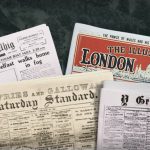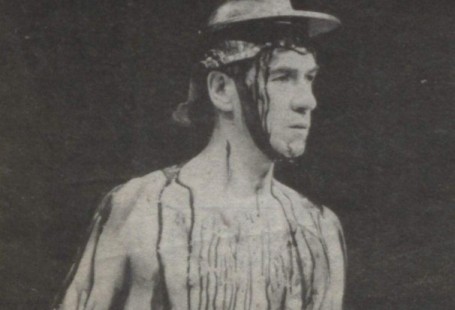This week the Caribbean is calling us here at The Archive, as we have five brand new titles from Jamaica, Dominica, Saint Lucia and Trinidad and Tobago joining us, which augment our collection of international titles. These titles help to tell the often confronting story of the British Commonwealth, chronicling the rise, the rule and the decline of the British Empire. Meanwhile, we have added 69,589 brand new pages to our collection this week, with the further addition of two brand new Irish titles.
So read on to discover more about all of our new and updated newspaper titles of the week, and also to learn about the British West Indies Regiment, which was founded in October 1915 and was formed from volunteers from British colonies in the West Indies.
Register now and explore the Archive
We begin our tour of our new Caribbean titles this week in Jamaica, with the Colonial Standard. This historic title was founded in Kingston in the early 1800s, appearing on a daily basis. Containing news from Jamaica, as well as from further afield, the Colonial Standard was sent back to Britain and provided a British audience with Jamaican news.
By 1870, the newspaper had been in ‘existence over fifty years.’ During this period, the Colonial Standard had:
…maintained its stand as the leader of the Jamaica press: whilst the extent and variety of the news and information in it causes it be sought with eagerness by every class in the Island, and a large number of copies are sent by each mail to subscribers in the sister colonies, Europe, America, and elsewhere.

Filling four pages, the Colonial Standard was also known as the Colonial Standard and Jamaica Dispatch. It featured news from local police courts and reports on coroners’ inquests, as well as lists of unclaimed letters.
Our next destination is Dominica, and we are delighted to have added two brand new newspaper titles for this Caribbean nation. First up, we’d like to welcome the Dominica Guardian to our Archive, which was established in 1893 in the Dominican capital of Rosseau. Edited by Afro-Caribbean journalist and Dominican nationalist Joseph Hilton Steber, the Dominica Guardian appeared every Saturday and filled four pages.
Steber was a powerful force in journalism and beyond, indeed, he was described as a ‘fearless man with an unbridled pen.’ Working previously as the sub-editor of the Dominican, he left that newspaper in 1893 when he became frustrated with its conservative attitude over the La Plaine Land Tax Riots. This was an uprising between heavily armed British Royal Marines and residents of La Plaine, who had not paid their taxes and were facing eviction.

Steber then joined the Dominica Guardian, despite lucrative offers from the Voice of St. Lucia, the Antigua Standard, and the Barbados Bulletin. He also had offers from further afield, from Black-interest titles in New York and Boston, but he turned those down too, stating how ‘My country demands my services.’ Steber edited the Dominica Guardian for another 25 years, the newspaper containing a lengthy editorial section, telegrams from across the world, and a look at events in Dominica. Steber Street in the Pottersville area of Rosseau is named after Joseph Steber.
Our second title from Dominica is the Dominica Chronicle, which was also published in the Dominican capital of Rosseau. Appearing every Saturday, and filling fourteen pages, this title is known as the national newspaper of Dominica, and was begun by Belgian Roman Catholic Bishop Philip Schelfhaut (1850-1921) in 1909. A ‘Dominican Tradition since 1909,’ the Dominica Chronicle is still going to this day and is known simply as the Chronicle.

Originally published bi-weekly, the newspaper contained ‘special telegrams’ that featured news from across the world, government notices, and ‘press cuttings’ from other titles. Meanwhile, the Dominica Chronicle had a heavy focus on local life, describing in detail weddings on the island, as well as welcoming back those who had returned home from their travels. Packed with advertisements, the Dominica Chronicle also reported on local cricket fixtures.
It’s a first for The Archive this week as we are proud to announce that we have added newspapers from Saint Lucia and Trinidad and Tobago to The Archive for the first time. Representing Saint Lucia is the Voice of St. Lucia, the national newspaper of the island since January 1885. Published in Castries, the capital of Saint Lucia and its largest city, the Voice of St. Lucia was founded by Irishman Robert George McHugh, and continues to be published to this day. As such, it is one of the oldest continually published newspapers in the Caribbean, and the oldest in the Eastern Caribbean.

Originally published once a week, moving to a bi-weekly publication schedule in the 1970s, the Voice of St. Lucia filled four pages and contained the latest shipping intelligence, including notices of arrivals and departures. It also featured local notes, and remarks on the sugar markets.
Rounding off our Caribbean newspapers this week is the Mirror (Trinidad & Tobago), which was first published in the Port of Spain on 1 January 1898. Edited by R.R. Mole, who had previously worked as a journalist in England, with sub-editor H.D. Carruthers as its chief reporter, who had the reputation of being both the best reporter and shorthand writer in Trinidad and indeed the West Indies, the Mirror cost two cents and filled eight pages.
Its first edition laid out its independent beliefs:
In the first place we have no political faith, because politics, as we understand them, do not exist in Trinidad; and, therefore, we represent no party. We are not the spokesman of any particular trade or industry; a newspaper such as we intend ‘The Mirror’ to be, is neither Catholic nor Protestant, and has no religious tenets except the broad general doctrines of Christianity. We do not represent any particular sport nor do we cater for any particular class, sex, or age.

With its intentions laid out, the Mirror was published twice a week and featured telegrams from across the world, from the likes of Cairo, Cuba, and China. It contained shipping intelligence, reporting on passengers and ships arriving and departing to and from the country. The Mirror also featured a section entitled ‘Trinidad Day By Day,’ as well as news from the police courts and details of the sales of sugar and cocoa.
We say farewell to the Caribbean and travel to less sunnier climes, to Ireland, where we welcome two brand new Irish titles to our collection. First up is the Carlow Nationalist, which was founded in 1883 and was published every Saturday in the county town of Carlow, in Ireland’s south east.
First published on 22 September 1883 at the cost of three halfpence, the inaugural edition stated the need for a newspaper in the local area:
The want of a local journal to meet the requirements of the large and important district, of which Carlow is the centre, has been generally recognised…It shall be our aim to make the ‘Nationalist’ a thoroughly representative organ of popular opinion, worthy of the times in which we live, and of the grand old Faith that has survived the persecution of centuries.

Unsurprisingly nationalist it is politics, given its title, the Carlow Nationalist was initially known as the Nationalist and Leinster Times. Featuring local church news, as well as news from the Carlow and Athy Petty Sessions, the Carlow Town Commissioners and various branches of the Irish National League, the newspaper also contained poetry.
From 1921 to 1996 the Carlow Nationalist was Carlow’s sole regional newspaper. Published to this day, with Conal O’Boyle as its editor, the Carlow Nationalist has the largest circulation of any other newspaper title in Carlow.
And from Carlow to Cork now, and we are delighted to welcome our final new newspaper title of the week to The Archive, which is the Cork Weekly Examiner. Sister paper of daily title the Cork Examiner, the Cork Weekly Examiner served the city of Cork in Ireland’s south west, the second largest city in the country. Founded in the 1890s, the Cork Weekly Examiner filled eight pages, as well as featuring a pictorial supplement, which was a one page drawing on a variety of different themes.

Packed with poetry, short stories and serialised fiction, some featuring additional illustrations, the Cork Weekly Examiner also featured news from across Ireland, Britain and beyond, and a variety of special interest features, from gardening to household notes. It also had a strong focus on the Gaelic Athletic Association, as well as reporting on the latest from the Cork Gaelic League. Meanwhile, the newspaper reported from the Cork County Board as well as the Cork Butter Market, detailing the latest law intelligence and reporting on football matches.
That’s it from our new titles of the week. Meanwhile, we’ve updated publications from across England (including the Huddersfield Daily Examiner and the Birmingham Daily Post), Wales (the Merthyr Express) and Scotland (the Stirling Observer), details of which you can find at the end of this blog.
The Formation of the British West Indies Regiment – October 1915
On 18 December 1915 our new newspaper title the Voice of St. Lucia reported how:
His Majesty the King has been graciously pleased to approve of the formation of a Corps from Contingents of the inhabitants of the West India Islands to be entitled ‘The British West Indies Regiment.’
Indeed, the newspaper went on to report how the ‘adoption of this official title has given general satisfaction.’ But how had the formation of the British West Indies Regiment come about? The regiment comprised of men who had travelled from the Caribbean to Britain to volunteer for war service, and originally these men had been placed across various units in the British Army. However, a decision was made to place them together into one regiment, the British West Indies Regiment.

And in total, 15,600 men would serve in the British West Indies Regiment. The majority of volunteers (two-thirds) came from Jamaica, with others volunteering from Trinidad and Tobago, Barbados, the Bahamas, British Honduras (now Belize), Grenada, British Guiana (now Guyana), Saint Lucia and St. Vincent.
Affirmation of the formation of the British West Indies Regiment would come in early November 1915, as the Voice of St. Lucia reported, with the regiment represented at the Lord Mayor’s show:
The advantage of the existence of the West Indian Contingent Committee received practical demonstration on November 9th, when a detachment of the British West Indies Regiment, under Major Golding and Captain Cavenaugh, came up to London to take part in the Lord Mayor’s Show. At the, for London, early hour of 9.30 the men, who had been met by representatives of the Committee at London Bridge, invaded the West India Committee Rooms, where they enjoyed half an hour’s rest and were regaled with Jamaica cigarettes and chocolate.

The newspaper went on to note how ‘there could be no mistaking the cordiality of the reception afforded to the West Indians, who not unnaturally were observed by all observers.’ Indeed, the Voice of St. Lucia contained reports from the British press, who reacted enthusiastically to the presence of the West Indian volunteers. Such reports focussed on the race of the soldiers, however, but it was reported that they were given a ‘specially hearty cheer’ by spectators.
On 11 December 1915 the Voice of St. Lucia provided a special look at camp life at Seaford, Sussex, where the 1st Battalion of the British West Indies Regiment was formed. The newspaper chronicles the daily lives of the men at the camp, who were woken by the 6 a.m. Reveille:
The camp soon springs into life, and as soon as the men are dressed they set about the first task of the day, which consists of cleaning up quarters, and is performed with great thoroughness, each hut being subsequently inspected.

Breakfast was then had at 8 a.m., with a ‘succession of parades’ following hourly until 1 p.m., when lunch was served. Tea was served at 5 p.m., after which the men of the regiment were:
...at liberty to go into the town or wherever they like ‘in bounds.’ It is no disparagement to their appearance when they first landed to say that their deportment is very different now from what it was then. The men are fully conscious of the honour which they enjoy of wearing the King’s uniform, and their military bearing and general demeanour shows that in no unmistakable way.
Meanwhile, the Dominica Chronicle on 29 December 1915 reported on how the men from the newly formed British West Indies Regiment were cared for during the Christmas period, far away from home as they were:
The British West Indies Committee has presented Christmas puddings for the British West Indies Regiment, and several hampers have also been sent to the Bermuda contingent. The Contingent Fund, which is being raised, has reached nearly £3,200.

The British West Indies Regiment would go on to serve with distinction in Palestine, Egypt, France, Flanders and Italy. The regiment was disbanded in 1921.
New Titles
Title |
Years Added |
| Carlow Nationalist | 1883-1916 |
| Colonial Standard | 1858, 1864, 1866, 1868-1869, 1871, 1873, 1875-1878, 1880-1888, 1890-1895 |
| Cork Weekly Examiner | 1896, 1898-1912 |
| Dominica Chronicle | 1911-1915 |
| Dominica Guardian | 1893-1920 |
| Mirror (Trinidad & Tobago) | 1898, 1904-1907, 1909-1911 |
| Voice of St. Lucia | 1885-1888, 1890-1915 |
Updated Titles
This week we have updated eight of our existing titles.
You can learn more about each of the titles we add to every week by clicking on their names. On each paper’s title page, you can read a FREE sample issue, learn more about our current holdings, and our plans for digitisation.
Title |
Years Added |
| Acton Gazette | 1984 |
| Belper Express | 1992 |
| Birmingham Daily Post | 1953 |
| Bootle Times | 1987 |
| Horley & Gatwick Mirror | 1987 |
| Huddersfield Daily Examiner | 1986 |
| Merthyr Express | 1989 |
| Stirling Observer | 1991 |
You can keep up to date with all the latest additions by visiting the recently added page. You can even look ahead to see what we’re going to add tomorrow.






